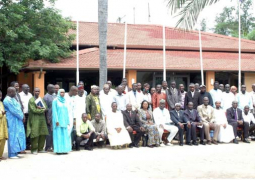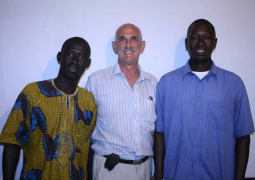THE ISLAMIC CENTER FOR HARMONIZATION OF SCHOOLS OF THOUGHT (ICFH)
THE PATH TO ISLAMIC UNITY
(Continued From "Religious Pluralism")
Religious Pluralism and the Transcendent Unity of Religions
The Catholic theologian Schillebeeckx responds to this problematic question by noticing that even in the Christian self-understanding...
The multiplicity of religions is not an evil which needs to be removed, but rather a wealth which is to be welcomed and enjoyed by all..the unity, identity and uniqueness of Christianity over and against the other religions.lies in the fact that Christianity is a religion which associates the relationship to God within the context of a historical and thus a very specific and therefore limited particularity: Jesus of Nazareth. This is the uniqueness and identity of Christianity, but at the same time, its unavoidable historical limitation. It becomes clear here that. the God of Jesus is a symbol of openness, not of confinement. Here Christianity has a positive relationship to other relations, and at the same time the loyal Christian affirmation of the positive nature of other world religions is honored.
The question here is where do the origins of religious pluralism lie? An answer can be that the principle of plurality is mainly based on the superabundant richness and diversity of God's self-manifestation to mankind. The religion of Islam acknowledges the principle of the plurality of religions to an even greater extent than dose Christianity, simply because it accepts all the previous monotheistic revelations and completes them. In this sense it dose not need to be explained much, whereas what calls for further discussion is Islam's problematic relationship with Hinduism and Buddhism. The solution to such a problem and similar problems can be found to lie in taking up an esoteric or transcendental point of view. The point of departure for the teachings of the transcendent unity of religions, as they have been formulated by their most important representative Frithjof Schuon, can, as paradoxical as it may seem, be found in the actual diversity of mankind and the corresponding limitations that such diversity and multiplicity call for.
The Transcendent Unity of Religions
The multiplicity of religious has its origin in the single divine Truth that has manifested itself in manifold ways to mankind throughout its history. These divine revelations occurred at different times, in different places, and to different human collectivities. Thereby they assumed different shapes. Thus, "what determines the differences among forms of Truth is the difference among human receptacles. For thousands of years already humanity has been divided into several fundamentally different branches, which constitute so many complete humanities, more or less closed in on themselves; the existence of spiritual receptacles so different and so original demands differentiated refractions of the one Truth.
This principle bears great meaning for there is no doubt that the Truth is one. In this context the revelations of the one divine Truth can be viewed as formalizations of this Truth. And the formalizations are not completely identical with this Truth- in-itself, because," Truth is situated beyond forms, whereas revelation, or the tradition that derives from it, belongs to the formal order, and that indeed by definition; but to speak of form is to speak of diversity, and thus of plurality
As a matter of course the principle of multitude of revelations is" not accessible to all mentalities and its implications must remain anathema to the majority of believers. This is in the nature of things. Nevertheless, from traditionalist viewpoint, anyone today wishing to understand religion as such and in the inter-relationships of the various traditions must have a firm purchase on this principle.
In this regard it has to be emphasized that every single revelation is the origin of a religion. And every religion is self-sufficient and comprises all that is necessary for man's salvation. But at the same time every religion is limited as a form. Frithjof Schuon has explained this coherence as follows:
"A religion is a form, and so also a limit, which, contains the limitless, to speak in paradox; every form is fragmentary because of its necessary exclusion of other formal possibilities; the fact that these forms- when they are complete, that is to say when they are perfectly -themselves - can in their own way represent totally, dose not prevent them from being fragmentary in respect of their particularization and their reciprocal exclusion."
Given diversity of revelations the question arises who the messengers were who received the respective revelation and passed it on. A first conclusion is that: "The great messengers, if they are assuredly one by their principle, in their gnosis and in the Logos, are not however of necessity equal on the phenomenal plane, that is manifestation on earth; what are equivalent are the messages when each is taken in its entirety. It is necessary, in any case, not to confuse the phenomenal or cosmic with the spiritual reality; it is the later which is one, and the former which is divers."
The understand the correlation between the diversity of revelations and the respective messenger; it has to be clarified that the revelation received by the respective messenger is the foundation of a religion. The peculiar imprint that characterizes every single religion indeed depends on when and where the respective messenger fulfilled his challenge and in what particular manner. According to this Seyyed Hussein Nasr, a follower of Fithjof Schuon could write: "When one says the prophet it means the prophet of Islam.when one says the Incarnation it refers to Christ who personifies this aspect. And although every prophet and saint has experienced ' enlightenment', the enlightenment refers to the experience of the Buddha which is the most outstanding and universal embodiment of this experience."
But how can a religion be understood and interpreted in this meaning? Essentially there are two elements which build the foundation of a religion: Namely
A-Doctrine.
B-Method.
Next edition will discuss the last two elements.
For more detail, see the following books:
1- Toward a Christian Theology of religious Pluralism. By Jacques Dupuis, S.J 1997, p386
2- Church, the Human Story of God. By Edward Schillebeeckx p.164.
3- Gnosis, Divine Wisdom. By Frithjof Schuon. 1979, p.29.
Traditionalism Religion in the Light of the perennial Philosophy, 2000, p.70.



